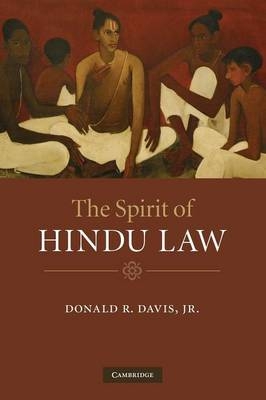
The Spirit of Hindu Law
Seiten
2013
Cambridge University Press (Verlag)
978-1-107-62757-4 (ISBN)
Cambridge University Press (Verlag)
978-1-107-62757-4 (ISBN)
This introduction to Hindu law and jurisprudence questions the traditional perception of law, and reveals law's close linkage with religion. Emphasizing the household, the family, and everyday relationships as additional social locations of law, it contends that law itself can be understood as a theology of ordinary life.
Law is too often perceived solely as state-based rules and institutions that provide a rational alternative to religious rites and ancestral customs. The Spirit of Hindu Law uses the Hindu legal tradition as a heuristic tool to question this view and reveal the close linkage between law and religion. Emphasizing the household, the family, and everyday relationships as additional social locations of law, it contends that law itself can be understood as a theology of ordinary life. An introduction to traditional Hindu law and jurisprudence, this book is structured around key legal concepts such as the sources of law and authority, the laws of persons and things, procedure, punishment and legal practice. It combines investigation of key themes from Sanskrit legal texts with discussion of Hindu theology and ethics, as well as thorough examination of broader comparative issues in law and religion.
Law is too often perceived solely as state-based rules and institutions that provide a rational alternative to religious rites and ancestral customs. The Spirit of Hindu Law uses the Hindu legal tradition as a heuristic tool to question this view and reveal the close linkage between law and religion. Emphasizing the household, the family, and everyday relationships as additional social locations of law, it contends that law itself can be understood as a theology of ordinary life. An introduction to traditional Hindu law and jurisprudence, this book is structured around key legal concepts such as the sources of law and authority, the laws of persons and things, procedure, punishment and legal practice. It combines investigation of key themes from Sanskrit legal texts with discussion of Hindu theology and ethics, as well as thorough examination of broader comparative issues in law and religion.
Donald R. Davis, Jr. is Associate Professor in the Department of Languages and Cultures of Asia, University of Wisconsin-Madison.
List of tables; Preface; Acknowledgements; Abbreviations; Introduction (dharmaśāstra); 1. Sources and theologies (pramāna); 2. Hermeneutics and ethics (mīmāmsā); 3. Debt and meaning (rna); 4. Persons and things (svatva); 5. Doubts and disputes (vyavahāra); 6. Rectitude and rehabilitation (danda); 7. Law and practice (ācāra); Conclusion; Bibliography; Index.
| Erscheint lt. Verlag | 22.8.2013 |
|---|---|
| Zusatzinfo | Worked examples or Exercises; Printed music items |
| Verlagsort | Cambridge |
| Sprache | englisch |
| Maße | 152 x 229 mm |
| Gewicht | 310 g |
| Themenwelt | Geisteswissenschaften ► Religion / Theologie ► Buddhismus |
| Geisteswissenschaften ► Religion / Theologie ► Hinduismus | |
| Recht / Steuern ► Allgemeines / Lexika | |
| Recht / Steuern ► EU / Internationales Recht | |
| ISBN-10 | 1-107-62757-5 / 1107627575 |
| ISBN-13 | 978-1-107-62757-4 / 9781107627574 |
| Zustand | Neuware |
| Informationen gemäß Produktsicherheitsverordnung (GPSR) | |
| Haben Sie eine Frage zum Produkt? |
Mehr entdecken
aus dem Bereich
aus dem Bereich
Unterweisungen in Zen-Meditation
Buch | Hardcover (2024)
Arkana (Verlag)
CHF 29,90


